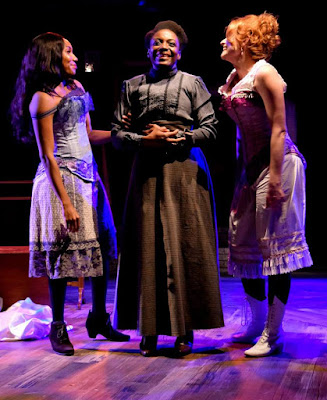By James V. Ruocco
In the stage version of "Murder on the Orient Express," legendary detective Hercule Poirot must find a killer on the loose in a carriage of first-class passengers and train personnel, each, of course, having a possible motive or two, a cleverly constructed back story, a suitcase chock full of lies, deceit and false alibis and a passport that may or may not contain the traveler's real name. In short, no one can be trusted.
Anyone familiar with the whodunit genre knows that Poirot, genius that he is, will solve the crime and bring the murderer to justice. That said, the story, nonetheless, carries the intensity and scope the original Agatha Christie conceit allows, offset by enough campiness, drama and schematics to make you want to grab yourself a ticket at the OE station and join Poirot for the ride.
At Hartford Stage, the train ride itself, i.e., the actual stage production, is a joy to behold much like the Orient Express itself. It's opulent. It's grand. It's showy. It's fun. It's flavorful. It's exotic. It's also a decidedly perfect throwback to yesteryear, bathed in warm, tantalizing nostalgia that's impossible to resist. I, for one, can't wait to see it again.
This edition of "Murder on the Orient Express" is being directed by Emily Mann who originally staged the production back in 2017 at the McCarter Theatre Center in Princeton, New Jersey. Anxious to thrill, excite and titillate, she crafts a dazzling, swiftly paced murder mystery at Hartford Stage that never once derails or stops dead in its tracks. She has great fun with the story. She has great fun with the characters. She has great fun with Ken Ludwig's deliciously wicked and quirky script. And she has great fun with the audience if only because you never exactly know what's up her sleeve or what she's going to throw out at you to keep you merrily off balance.
Yes, this is a whodunit. And yes, the list of suspects are rife with clues, deceits, motives, rituals, explanations, pretenses, lies and surprise twists. Still, you are asked to play detective along with Poirot. And you and you alone are forced to play the game, solve the crime and decide who's the murderer and decide whether or not he or she is guilty. And whether or not he or she was acting alone.
If you've seen the 1974 film with Albert Finny, Lauren Bacall, Jacqueline Bisset and Ingrid Berman or the sumptuous 2017 remake starring Kenneth Branagh, Michelle Pfeiffer, Penelope Cruz and Johnny Depp, then, you already know the answers. Regardless, this "Murder on the Orient Express" is such exhilarating fun, you eagerly forget the actual whodunit ending, settle back in your seat and act as if you're seeing this Agatha Christie thriller for the very first time.
Working from Ludwig's cheeky script, Mann delivers a production that is fast, fluid and cinematic in its approach to theatrical storytelling. She handles the material with the care and calculation of a bonified murder mystery buff. But she doesn't go overboard or misstep the whodunit genre just for the sake of laughter, drama or characterization. From start to finish, this is a very focused, cleverly orchestrated production.
The genius of this "Murder on the Orient Express" comes from the fact that Mann's production is gift wrapped in charm, razzle-dazzle, sparkle, whimsy, pathos, virtuoso and wonderful splashes of color including a gleaming, shiny silver and very rich, seductive crimson. Everything falls into place nicely from the strategically placed black curtains that open, close and frame the impending action of the actual train that moves, stops, or shifts back and forth to reveal the next scene backed by some smart lighting, sound and music cues. And let's not forget the splendid period costumes which reflect a bygone era of lushness, glamour and sophistication.
"Murder on the Orient Express" stars David Pittu as Hercule Poirot, Julie Halston as Helen Hubbard, Veanne Cox as Princess Dragomiroff, Susannah Hoffman as Mary Debenham, Leigh Ann Larkin as Countess Andrenyi, Charles Paul Mihaliak as Army Officer and Porter, Samantha Steinmetz as Greta Ohlsson, Ian Bedford as Col. Arbuthnot and Ratchett, Maboud Ebrahimzadeh as Michel and Head Waiter, Juha Sorola as Hector MacQueen and Evan Zes as Monsieur Bouc.
In a play such as this one, casting is everything. And Mann has assembled an impressive, dynamic line up of actors and actresses who have as much fun acting out this amazing whodunit as we do watching them. Everyone acts and emotes at the top of their considerable form. Nothing looks rehearsed or out of place. Everyone completely understands the murder mystery genre and their role in the actual telling of the story. They also know how to shift blame, look guilty and lead the audience astray with false hopes and possible clues. And with Mann as guide and instructor, they completely forget it's 2018 outside and remain totally in sync with the play's 1930's setting, language, melodrama, mannerisms, language, stylization and period whimsy.
"Murder on the Orient Express" is a thrilling, exciting production that abounds with beauty, class, wit, sarcasm, intelligence and imagination. The script by Ken Ludwig is chock full of splendid witticisms, characters, dialogue and surprises. Emily Mann's direction is wonderfully inspired. The entire cast is simply amazing. The design team has created a three-dimensional work that is gorgeous to look at. And the story itself, is enjoyable enough to make you call the box-office the next morning to book seats for a return engagement or two.
"Murder on the Orient Express" is being performed at Hartford Stage (50 Church St., Hartford, CT), now through March 25.
For tickets or more information, call (860) 527-5151
website: hartfordstage.org



















































